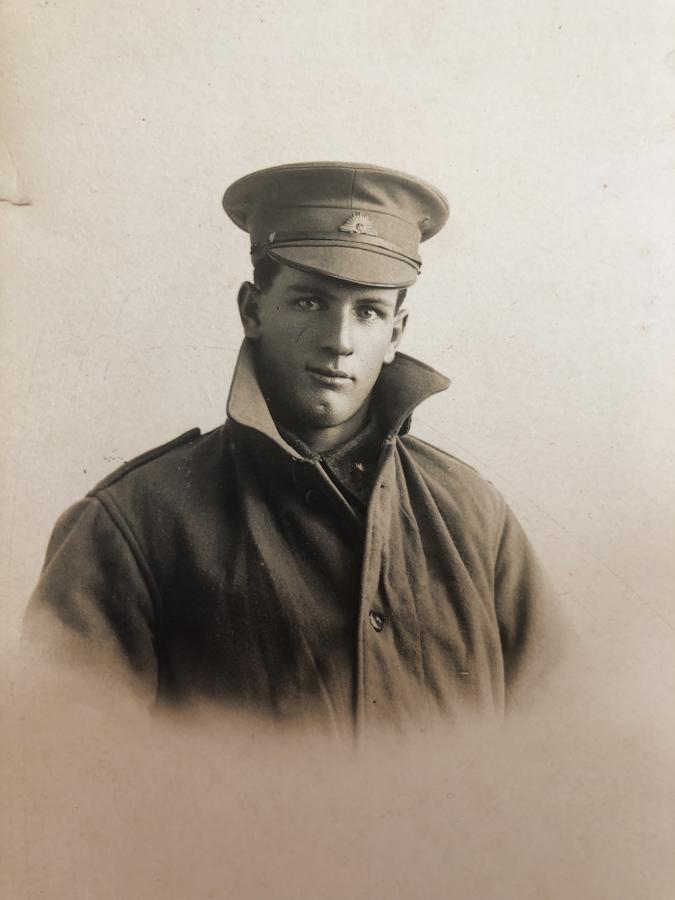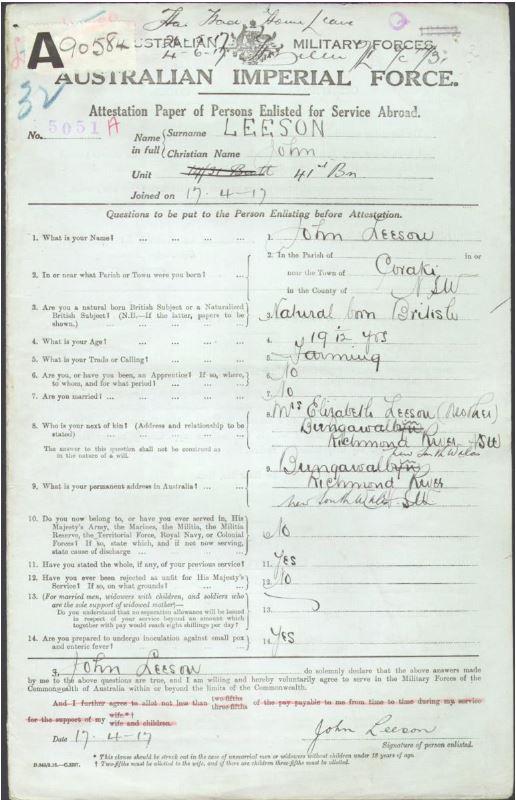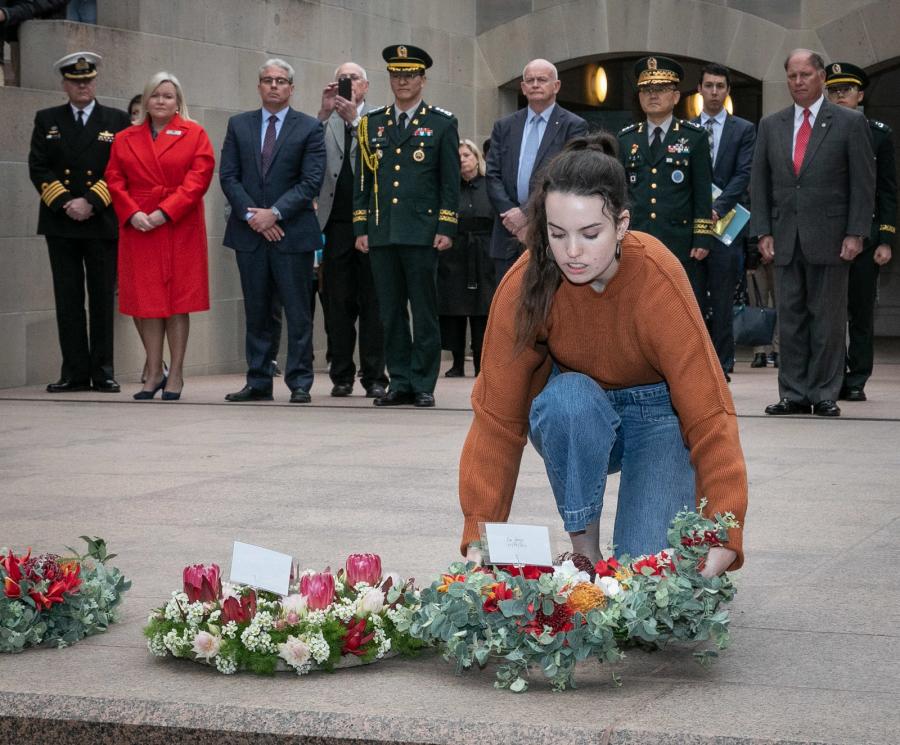'It was just so intense'

Zoe George at the Memorial with Corporal Daniel Keighran VC.
Zoe George always knew that her family had a proud history of military service. What she didn’t know was that her great-grandfather John Leeson fought in the battle of Amiens.
The battle was the beginning of what became known as the Hundred Days Offensive, a string of Allied successes on the Western Front that ultimately led to the collapse of the German army, and the end of the war.
“I knew a little bit about them before visiting the Memorial, but not a whole lot,” Zoe said.
“Their medals are up on the wall at home, and although I’ve always had an immense respect for the Anzacs and the Australian military because my family has a history of fighting in nearly every major conflict we’ve had so far, I don’t think I really appreciated it as much as I do now.”

Zoe’s great-grandfather John Leeson enlisted during the First World War.
Zoe was visiting the Australian War Memorial in Canberra to learn more about her family’s military service, thanks to the Gallipoli Scholarship Fund.
The Gallipoli Scholarship aims to foster an understanding among young people of the enduring traditions of perseverance, courage, self-sacrifice, and mateship forged on Gallipoli, and to raise awareness of the sacrifices of Australians who have served in war and on peacekeeping operations.
“I think it’s really important to remember because it not only reminds us of where we came from, and the past experiences that we’ve had, but it’s also a warning for the future,” she said. “I think if more young people had a deeper emotional connection, or a better understanding of our past experiences, we’d be much better at understanding the cost of war in the future.”
An accomplished singer, dancer, and actor, Zoe moved to Sydney from Armidale in country New South Wales to study a Bachelor of Theatre Studies at the Academy of Music and Performing Arts. She was awarded a Gallipoli Scholarship in 2018, and is one of the first two recipients of the inaugural Bill Hall Bursary in 2019, which provides assistance for a second year of study.
It is awarded annually to a direct descendant of an Australian who served during the First World War, Second World War, or the Korean War.

For Zoe, the chance to visit the Memorial and learn more about her family history was particularly special.
“It’s just so poignant,” she said. “It has given me a much greater link to the past, and I think just being at the Memorial does that to you.”
Zoe’s great-grandfather, John Leeson, enlisted in the Australian Imperial Force (AIF) in April 1917 and served on the Western Front with the 41st Australian Infantry Battalion.
When the German Army launched its last great offensive in March 1918, the battalion was rushed south to France where it played a role in blunting the drive towards the vital railway junction of Amiens.
When the Allies launched their own offensive on 8 August 1918, the 41st played an active role both in the initial attack and the long advance that followed throughout August and into September.
The combined British, Canadian, and Australian attack succeeded in breaking into the German positions around Amiens as Allied forces advanced some 13 kilometres, the largest single-day gain by the British Army in the entire war. In his post-war memoirs, General Erich Ludendorff described 8 August as “the black day of the German Army”.

“To think that this is a battle my great-grandfather fought in is just crazy,” Zoe said. “He is actually recorded in the unit war diary because he was promoted to lance corporal on that day. It was just so intense; they faced incredible hardship, and it was just amazing to be able to learn more about that, and to emotionally connect to that.”
Zoe’s great-great uncle, Harold Leeson, also served during the First World War as did her great-great grandfather, Gordon St Clair.
Gordon St Clair was a working as a commercial traveller when he enlisted in February 1916 at the age of 29. Initially a Sapper, he was promoted to Acting Corporal in April 1916 and was confirmed as a Corporal in May 1916.
“He was in the 1st Tunnelling Company in France,” she said. “And he was at Hill 60 just before the big Hill 60 explosion happened. He was sick in hospital a lot during the war with pneumonia because it was quite damp and wet with the tunnelling. He returned to Australia, and also served during the Second World War as did some of my other relatives.”
When war broke out just a few decades after the end of the First World War, Gordon, John and Harold re-enlisted in the Second AIF and Zoe’s great-uncle, Norman Leeson, joined the Royal Australian Air Force.

Zoe laid a wreath at a Last Post Ceremony at the Memorial in memory of their service and all those who served.
“It was quite a sombre moment,” she said. “I really felt in mourning for all the people who have died in war or as a consequence of war and it was just so emotional.
“It’s really hard to gain a true understanding of how much loss there has been through war and how important Australian soldiers have been in peacekeeping operations until you really dive into the research and visit the Memorial.
“I learned so much about our country’s war history. The rich stores of history that the Memorial has to offer, as well as the [staff’s] knowledge and respect for such a poignant subject, was so inspiring to see and experience. I definitely left with a renewed respect for our country’s war history as well as the people who fought in it.
“I found myself thinking on the way home about the countless people who have sacrificed their lives in varying conflicts, and I could not fathom the emotions they and their families felt.
“Another thing I [felt] was the emphasis the Memorial places on peace and utilising the past to create an awareness of the seriousness and atrocities of war for future generations. I really do hope that the Memorial will continue to be an educational hub for young people in this regard.
"I think it’s just so important for future generations to understand the massive and positive impact that Australia and its soldiers have had on a global scale.”